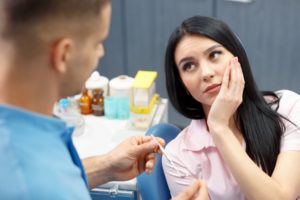
You may not have noticed it, but dentists are routinely checking your mouth, head, neck, lymph nodes and many areas of your mouth for early signs of oral cancer. Approximately 50,000 people are diagnosed with oral cancer annually, causing many dentists to include the practice and even new technology into their comprehensive exams to catch it more easily.
Even if you don’t have any family members who have never had cancer, it doesn’t mean you should skip a visit to a dentist in Owing Mills.
The Growing Risk of Oral Cancer
Over the past several decades, dentists and other medical professionals have created a list of the most common risk factors for oral cancer. More often than not, those diagnosed with oral cancer are more likely to have at least one risk factor. However, it’s been reported that some individuals had no risk factors at all leading up to their diagnosis.
What’s more unsettling is the number of young people diagnosed. Most individuals are over the age of 40 when they’re told oral cancer is present, but researchers have confirmed that HPV, also known as the human papillomavirus, is associated with an increased risk of oral cancer. Since this virus tends to affect young people more often, it effectively increases this group’s risk of oral cancer as well.
While everyone should be getting checked for this deadly disease, those with the following additional risk factors should carry even more incentive. These include:
- Smoking or tobacco use
- Heavy alcohol use
- Gender (men are at higher risk)
- Unhealthy diet
- Prolonged sun exposure
Early Prevention is Key
One of the reasons oral cancer is so deadly is because of how difficult the early signs can be to recognize on your own. Virtually no symptoms can appear in the early stages, making it even more difficult to catch and treat. Imagine what not visiting the dentist for a few years can do in terms of your risk!
Furthermore, catching oral cancer early makes it far easier for doctors to treat. Approximately 84 percent of oral cancer cases can be detected by dentists. Considering that only 57 percent of those diagnosed will live longer than five years, there’s a very large incentive to get checked regularly.
The Signs to Recognize
To help you stay protected, conduct an oral cancer self-exam every month on top of your biannual visits to a dentist in 21117. If you notice any of the following signs, contact a dentist right away:
- Sore throat or hoarse voice
- Red or white spots in your mouth that feel numb or painful
- Mouth sores that don’t heal after a two-week period
- Loose teeth or poorly fitting dentures
- Difficulty chewing or swallowing
- Ear pain or swollen lymph nodes
Family history isn’t enough. The only way to know for sure if you’re cancer-free is to visit a dentist! Schedule an appointment today!
About the Author
Dr. Monica M. Mattson conducts oral cancer screenings during each checkup to protect patients from dangerous systemic diseases like oral cancer. To make sure your family members have no symptoms, you can contact her through her website to schedule a screening.
